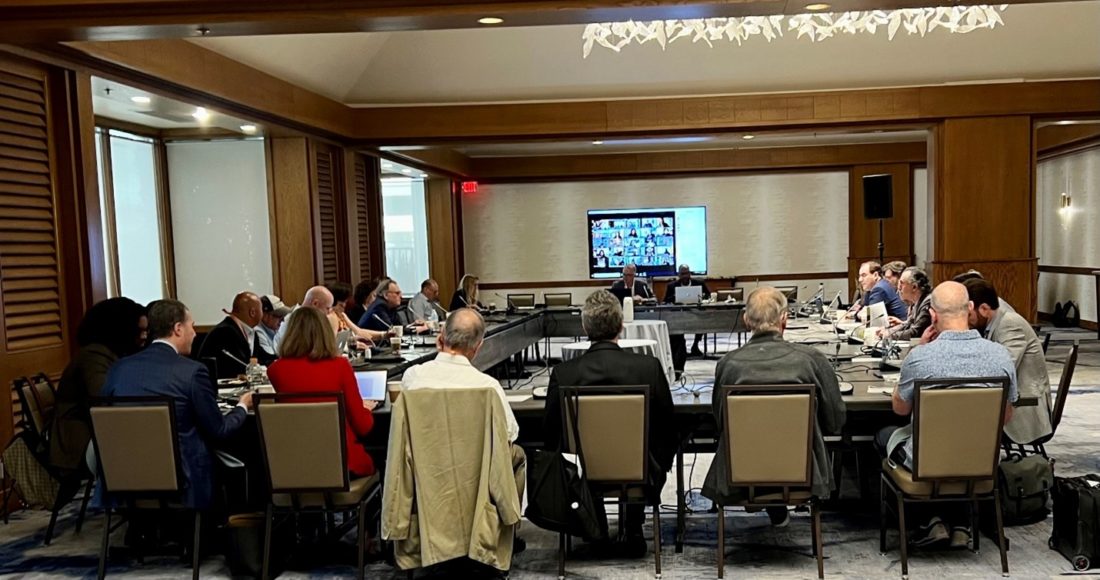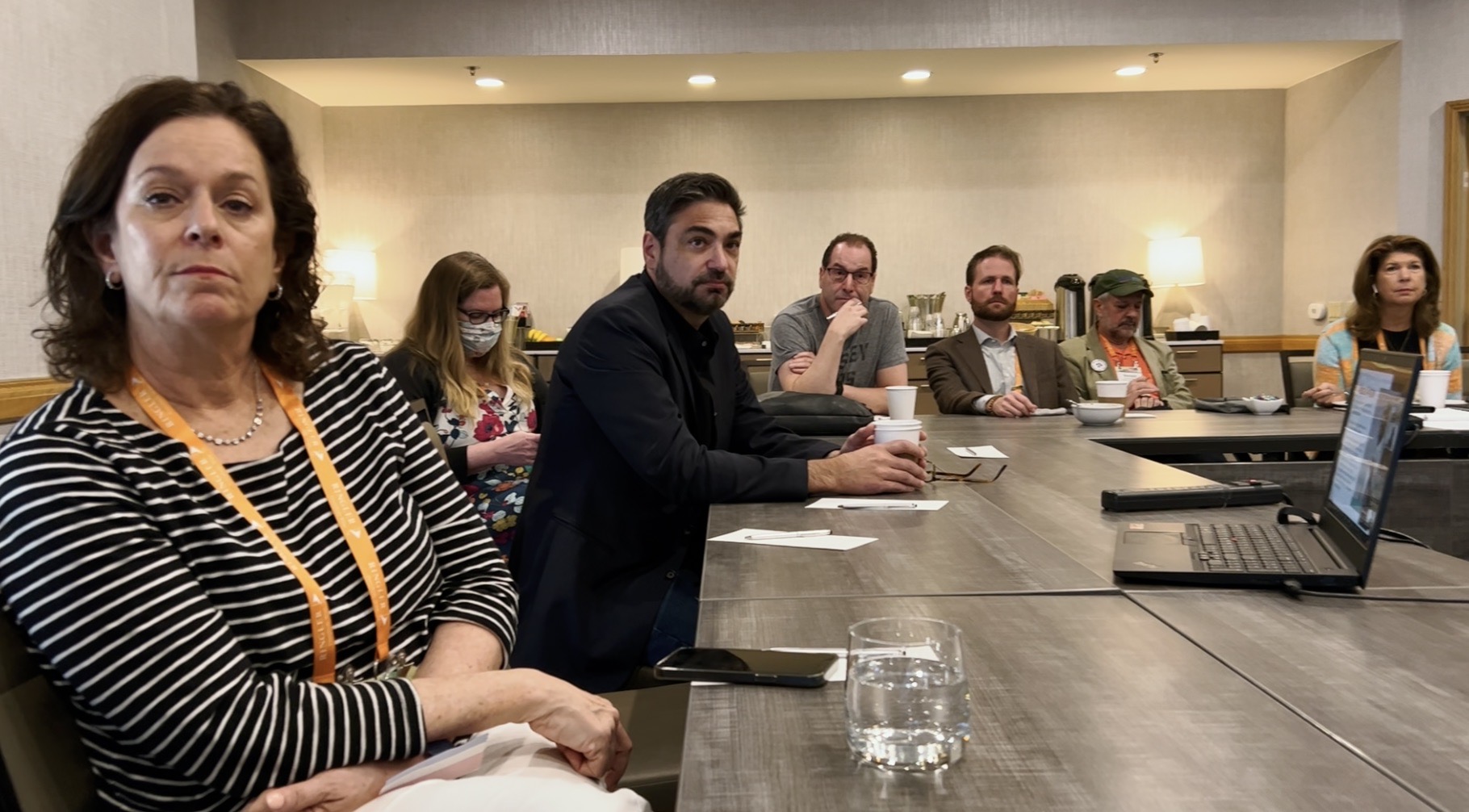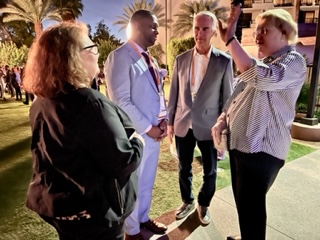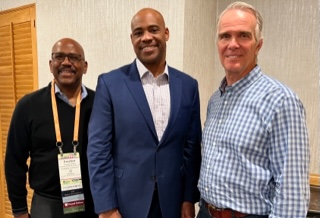
Trial lawyers are ‘people who care about other people,’ says Public Justice’s Eric Cramer
By Karen Ocamb, Director of Media Relations for Public Justice
Trial lawyers not only wrestle wrongdoing in the courtroom, they are still battling the seemingly eons-long misreading of Shakespeare’s classic line: “The first thing we do, let’s kill all the lawyers.” In fact, Shakespeare apparently intended the rallying cry from “Henry VI, Part 2” as a backhanded compliment since it sprang from the foul-mouth of a ruffian buffoon named Dick the Butcher trying to please his leader, an ex-convict, soldier of fortune and scoundrel named Jack Cade who conned his way into claiming the crown during England’s War of the Roses. In Shakespeare’s culturally competent world, lawyers are the champions of justice in the ongoing war between tyranny and democracy.
Nothing so dramatic occurred in Palm Desert, California but the convening was nonetheless both lofty and deep as Public Justice Board members met February 14-15, 2022 to discuss deepening and strengthening their 40-year mission and commitment to workers, consumers, the environment and those whose civil rights remain under constant attack. At their core, the lawyers who compose Public Justice’s Board embrace the organization’s progressive public interest work as a noble public service – helping “the little guy” – consumers, employees, students and more — fight the big corporations, employers, polluters and discriminatory institutions. Over the years, however, paying attention to the human beings at the center of their cases started to take on more significance. Securing justice, the trial bar understood, wasn’t just about making good law or correcting bad ones – justice mattered to real people in real, tangible ways. Civil rights mattered. Environmental justice mattered. The whole spectrum of the food system mattered. And without access to justice, nothing else mattered. Public Justice was, to put it simply, about public justice.
But fighting system oppression, committing to taking on the evils of systemic racism, sexism, homophobia and transphobia requires a deeper layer of resolve — discovering and dispatching the hidden fonts of implicit bias that keep good, caring lawyers from being great and changing the world.
That work was front-and-center in Palm Desert on Valentine’s Day. Ironically, another line from Shakespeare applies: “Recognize thyself in the mirror of thine own truthfulness.” Here are some of their insights into the Public Justice community.
“I have known about Public Justice for most of my career. And I’ve always thought that the organization does fantastic work. Primarily, I felt that it was time for me to give back a little bit, and I see it as more of a service type role, which I enjoy a lot,” said Executive Committee member Mitchell Breit.
“Well, we’re people who care about other people and about the other people who we’re working with. But trial lawyers are people who represent average Americans, average human beings, and trying to make lives better for all of those people,” said Eric Cramer, immediate past President of Public Justice who led the organization during the COVID crisis. “And the other thing about trial lawyers is that, ultimately, we need to take complicated concepts and issues and explain them to juries, to people who aren’t lawyers, who didn’t have lots of education. And so, part of that is empathy and being able to explain and convince others of wrongs that have been done to your clients and to groups. I do class action law. And I do antitrust cases, and we need to take complicated economic concepts and explain them so people can understand them and be empathetic with your clients about what’s been wrong and done wrong to them. And so I think that kind of empathy creates community among the other people who are doing that and the people that we work for.”
“I think it’s an incredible organization and it’s a really incredible how it’s grown under the incredible leadership that we’ve had, including Paul [Bland] and others who run the organization. I think it’s also building on its roots. There are founders of this organization that are still involved decades later, and that’s a testament to the organization. And we’re building upon those roots and the things that those people have created and going further into the future and helping more people in different ways,” Cramer continued.

Public Justice DEI Committee meeting Feb. 14, 2022 in Palm Desert. Photo by Karen Ocamb/Public Justice.
“I think it’s going to continue developing, and expanding, and adapting and being opportunistic about things that we can do to help the constituencies that the organization supports. I think there’s going to be a big push for racial justice, and gender justice, and DEI issues, both on the board and as a lens for the kinds of cases that we take on and the communities that we help. And so I think it’s going to develop in that way, while continuing with the core issues that the organization has always been about. About making justice and the courts available for everyone and then proving that in some specific ways, with regard to food and food justice, and debtors’ rights, and environmental issues, and civil rights for students, in particular, and for others. So, I think we’re going to develop those areas and add a racial justice and gender justice lens to those areas.”
“One of the things in discussion with my fellow board members — what they realize is that this is a journey and it’s not something that you can snap your fingers on and it’s over,” said Board Vice-President Preston Tisdale. “Because…in terms of implicit biases, they’re so baked in, they’re so embedded into our culture and our thought processes that people act on them flexibly without even thinking. That’s what’s so are dangerous. What we understood on the DEIA Committee was that the reason there was a need for our own consultant was because people were at different stages of understanding of implicit bias and its history. And most of it’s not known, because most of it’s not taught in this country at all. It’s not even talked about. So if it’s not taught, then people come to conclusions that can be dangerous as we have seen by those who wish to push them in dangerous directions.”
“And so the Board, they undertook this process very seriously,” Tisdale continued, “the board members working on it and they began working. And many had different viewpoints and perspectives. But what I like to think is they came to the subject in good faith. And when people come in good faith – well, you have to deal with the fact that they don’t have that lived experience, they may not have had that learned experience. And so, we have to take the time and patiently walk through the aspects of it. And most people of good faith will come to an understanding that guess what? They need to learn more and they need to do more to try to overcome implicit biases.”
On Valentine’s Night, Public Justice held a Presidents’ Party and Reception with the American Association for Justice (AAJ) and their Minority and LGBT Caucuses. They were welcomed to the Coachella Valley by Palm Springs Mayor Lisa Middleton, who made history when she was elected as Palm Springs’ first transgender city council member and again, when she was elected mayor — only the third trans mayor in the country.

Amy Heins, Chair AAJ’s LGBT Caucus; AAJ President Navan Ward, Jr.; Public Justice President Dan Byrson; Palm Springs City Council, Mayor Lisa Middleton. Photo by Karen Ocamb/Public Justice.
“I, as Mayor, I get to welcome a number of individuals coming to our community, but I can’t tell you what an honor it is to welcome you,” Middleton said. “The work that you do each and every day, defending those who need an attorney, someone who will represent them, someone who will stand up to the bullies, be they individuals, politicians, corporate leaders or anyone else who stands in the way of equality and injustice for everyone.”
“There is no other organization that shares as many core values with regards to protection of our clients and victims of consumer wrong than Public Justice and AAJ,” said AAJ President Navan Ward, Jr.. And so I am really excited and I’m really happy when we are able to share events like tonight, along with our Minority Caucus and LGBT Caucuses. And so, because access to justice is a core value that we both have, I implore each and every one of you to continue your support of AAJ, as well as Public Justice. As keeping the court outdoors open is something that we all have to do, must do, if we want to continue our democracy.”
“The LGBT Caucus is open to everybody. It is open, to obviously self-identified LGBTQ people, but also everybody who identifies as an ally. And in my opinion, if you are here and you are looking at me speak, you are an ally,” said Amy Heins, Chair of AAJ’s LGBT Caucus.
“Public Justice — they do the type of work that we all went to law school for. They’re doing very good, very important work, and they really need our support,” Ervin Nevitt, Chair-Elect of AAJ’s Minority Caucus.
“Erie Moore was a Black man. He was a father. He like to sing – we had that in common,” said Leslie Bailey, Director of the Debtors’ Prison Project at Public Justice. “And he was arrested for disturbing the peace. It’s a misdemeanor in Louisiana, where he was from. And he was taken to a for-profit detention center. 24 hours later, he was declared brain dead and the facts that emerged after this happened were pretty alarming. There’s video footage showing that he was taken into the cell of an inmate who had a reputation for violence. They had an altercation. A few minutes after that the guards went into his cell, punched him in the back of the head, forcibly remove, moved him from the cell, dropped him twice on the floor of the detention center. And then everything shifts off camera because they took him to a room that doesn’t have any cameras in the prison where they beat him half to death.
“They never gave him medical treatment and he only finally was discovered later when he was taken to the hospital to be bleeding from the head and unresponsive. His family brought a lawsuit against the private prison company and its management company, LaSalle Management. They were represented by a righteous, solo practitioner from Louisiana who did a great job, but the district court dismissed the case out of hand — basically rubber-stamped all the arguments that the company made,” Bailey continued.
“We found out about the case because my colleague was doing research for Debtors’ Prison Project and he said, ‘Wait a minute, this court just basically dismissed this case and among other things, they held that corporations are categorically immune from punitive damages in civil rights lawsuits.’ But we think we finally have a chance to get justice for Erie Moore and his family. So that’s just one of the civil rights cases we’re working on in the Debtor’s Prison Project, which I run. We’re fighting for-profit probation in Alabama where a private company collects court debt for the city and charges monthly fees to probationers and then probationers are too poor to pay — these are the are traffic tickets — so municipal court. These are very, very poor people. And if they can’t afford to pay, the company revokes their probation and they get sent to jail. So that’s just one of the things I’m fighting in the Debtor’s Prison Project.”
The next day, the Public Justice Board hunkered down and continued their journey.

Public Justice Vice-President Preston Tisdale, DEIA consultant Anton Gunn, Public Justice President Dan Bryson. Photo by Karen Ocamb/Public Justice.
“We had a great presentation by Anton Gunn – ‘The Six Traits of Inclusive Leaders.’ It was a fabulous talk – it was at the DEIA committee meeting. It really helped us explore a lot of the implicit biases we had. Anton recommended that everyone take this Harvard Implicit Bias Test,” said Public Justice Board President Dan Bryson. “Even though we’ll continue to do high impact litigation, we realized that so many of the problems that we face are grounded still in racism and sexism that we need to be cognizant of that. We need to overcome our implicit biases so that we engage in cases that will help address those issues.”
Bryson’s final word from Palm Desert: “If you want to help change the world, support Public Justice.”
Click here to go to watch this story on Public Justice’s YouTube channel.



